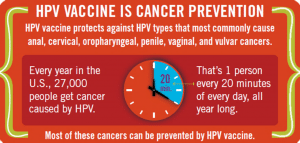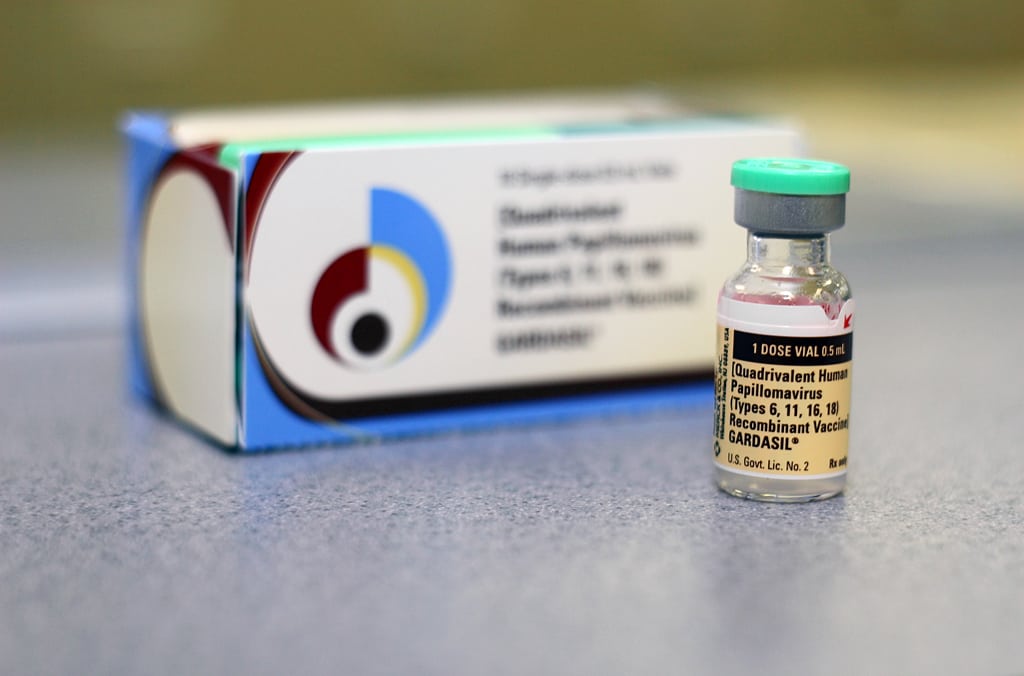HPV, or human papillomavirus, is the most common sexually transmitted infection. In fact, most sexually active men and women will get HPV sometime in their lives. While most young kids are not at risk of getting HPV, it’s important to get the HPV vaccine during childhood. This will help to protect against HPV later on. Especially true, kids have great immune responses and respond well to vaccines!
The AAP recommends that all boys and girls ages 11 or 12 years should get the HPV vaccine.
There are many different types of HPV, and only certain types cause health problems. HPV strains can cause cancer and genital warts, though some types produce no signs or symptoms.
HPV is easily passed between individuals, and many don’t know if they’re infected. For this reason, getting the vaccine is important for all individuals ages 11-26. The vaccine is not recommended for people older than 26 or younger than 11, except in some special cases.
Not Getting the HPV Vaccine
 Individuals that have weakened immune systems are more likely to develop health problems related to HPV. So, it’s important to get vaccinated, especially if you have an immune condition.
Individuals that have weakened immune systems are more likely to develop health problems related to HPV. So, it’s important to get vaccinated, especially if you have an immune condition.
HPV is known to cause genital warts and some cancers. Cancer sometimes takes many years to develop after being infected with HPV. It’s important to note that the types of HPV that cause genital warts are not the same as the types that cause cancers.
According to the CDC, “HPV can cause cervical and other cancers including cancer of the vulva, vagina, penis, or anus. It can also cause cancer in the back of the throat, including the base of the tongue and tonsils (called oropharyngeal cancer).”
How to Protect Against HPV
Get the HPV Vaccine
Kids and adults (both males and females) ages 11-26 who have not yet had the HPV vaccine should be vaccinated. The AAP recommends immunization against human papillomavirus (HPV) for all 11- through 12-year-old children as part of the adolescent immunization platform.
HPV4 vs. HPV2
The quadrivalent HPV vaccine (HPV4) is the only vaccine approved for males, and either HPV4 or the bivalent HPV (HPV2) vaccine may be used in females. HPV4 is designed to protect both males and females from four of HPV strains known to cause cancer and genital warts. HPV4 contains no viral DNA and is not infectious. HPV2 protects against two dangerous strains of HPV and is not approved for males.
These vaccines are given in a series of three doses over six months. The first is now, the second is in 1-2 months, and the third is in 6 months.
The CDC recently approved giving only two shots for individuals under age 15. They found that two doses are just as effective as three in these younger individuals. While this is true, the third shot does not pose any extra health risk.
Get screened for cervical cancer
Women ages 21 to 65 should be screened routinely for HPV. This screening can function to prevent cervical cancer. Pregnant women should not be vaccinated.
Cervical cancer is the second most common cancer in women worldwide. According to the World Health Organization, “In 2008, there were an estimated 529,000 new cases and 274,00 deaths due to cervical cancer. More than 85% of cervical cancer deaths are in developing countries, where it accounts for 13% of all female cancers.”
Getting the HPV vaccine will help to prevent cervical cancer for all young females. While men don’t get cervical cancer, HPV also causes cancer in men.
Vaccine Risks
In two case report series since 2013, there have been 6 cases of a condition known as a premature ovarian failure (POF), or premature menopause. This is a very rare, yet serious condition in young women. Aside from these 6 cases, there have been no other adverse events of HPV and no change in the frequency of POF cases.
Otherwise, the HPV vaccine has been used throughout the world for about six years and has been very safe.
Commonly, 1 in 3 individuals who have had the HPV vaccine report experiencing headaches. Some patients experience some pain or redness around the injection site. Few individuals experience fever. Allergic reactions are very rare.
Naturally, HPV is not a mandatory vaccine. While we at GHT think that most should be vaccinated, your personal beliefs and exceptions are important to us. It’s important to keep an open conversation with your pediatric provider. At GHT, we use Gardasil for the HPV vaccine.
For questions or concerns, respond to this post or contact us!




